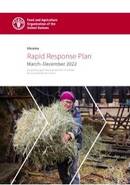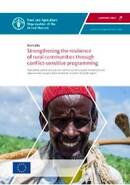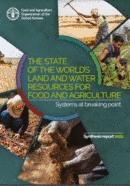Publications
The war in Ukraine that began on 24 February 2022 has led to large‑scale human suffering across all regions of the country. As the dynamics of the war continue to evolve, large portions of the population are affected by damage to critical infrastructure, lack of basic services and disruptions of supply chains, requiring multisectoral humanitarian assistance.
In order to address the rapidly deteriorating food security situation, the Food and Agriculture Organization of the United Nations has updated its Rapid Response Plan (RRP) for Ukraine, calling for a revised funding requirement of USD 115.4 million, to support 376 660 vulnerable smallholder and medium‑sized farming households through December 2022.
The RRP has been designed to meet critical, time-sensitive agricultural deadlines for production and harvest, and address market functionality and access for vulnerable populations. It is anticipated that the RRP will be followed by a continuing programme based on the evolution of the crisis.
Somalia – Strengthening the resilience of rural communities through conflict-sensitive programming: Translating context analysis and conflict-sensitive recommendations into adjustment in project implementation in Lower Shabelle region.
This learning brief documents learning around promising programme approaches that can support decision-making and resource allocation processes towards durable solutions to food crises. More specifically it provides an overview of the linkages between the conflict-sensitive programming approach undertaken by the Food and Agriculture Organization of the United Nations (FAO) in Somalia and the related adjustments into the Global Network against Food Crises (GNAFC) project implementation. The brief showcases key learning on the role of water governance in reducing local-level natural resource-based conflict in the Lower Shabelle region of Somalia. Conflict‑sensitive programming - informed by a context analysis – is a fundamental requirement so that projects and programmes are undertaken with a clear understanding of contextual dynamics, thereby lessening their potential to exacerbate tensions, disputes, and conflicts while enhancing contributions to sustaining peace.
The state of the world’s land and water resources for food and agriculture: Systems at breaking point (SOLAW 2021)” Synthesis Report comes at a time when human pressures on the systems of land, soils and fresh water are intensifying, just when they are being pushed to their productive limits. The impacts of climate change are already constraining rainfed and irrigated production over and above the environmental consequences resulting from decades of unsustainable use.
FAO is deeply concerned about the food security situation in Ukraine. The war that began on 24 February 2022 has caused extensive damage and loss of life in key population centres, spread across rural areas, and sparked massive displacement. It is clear that the war has resulted in a massive, and deteriorating, food security challenge. It has already significantly disrupted livelihoods during the agricultural growing season, through physical access constraints and damage to homes, productive assets, agricultural land, roads, and other civilian infrastructure.
It is uncertain whether Ukraine will be able to harvest existing crops, plant new ones or sustain livestock production as the conflict evolves. As insecurity persists, and both local and national supply chains are disrupted, people are likely to fall deeper into emergency levels of hunger and malnutrition. Noting that the immediate food security dimension of this conflict is related to food access and not food availability, agricultural production must be allowed to resume immediately and safely to avoid further potential impact on food security in Ukraine – and beyond – in the coming days, weeks and months.
The Food and Agriculture Organization of the United Nations (FAO) is extremely concerned about the effects of the war on lives and livelihoods in Ukraine. The war has already caused extensive loss of life and damage to infrastructure, and the situation remains extremely volatile, with likely significant impacts on food security and agricultural livelihoods. FAO is staying and delivering, and has reinforced its team in Ukraine. About 10 percent of the USD 50 million requested by FAO under the Rapid Response Plan for Ukraine has been received to date. Funds received so far will enable FAO to assist 23 000 vulnerable rural men and women farmers around Donetsk, Luhansk, Dnipropetrovsk and Zaporizhzhia. If more resources are made available now, FAO will be able to increase the number of rural people assisted this spring season.






